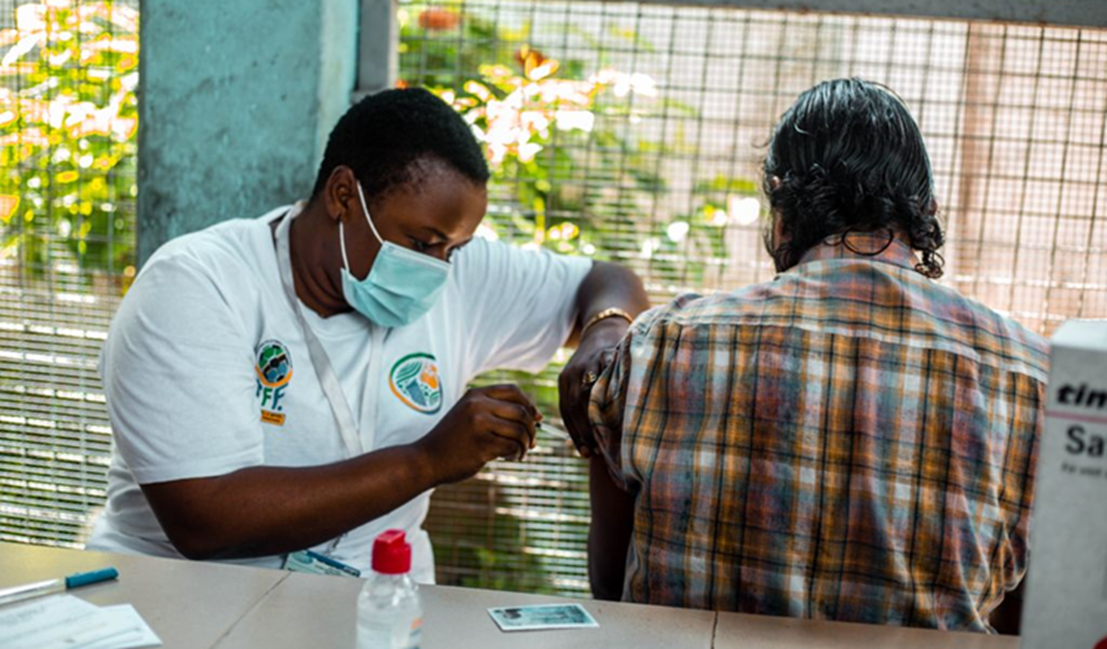Andrea Surette, FHI 360
Theresia Mrema, FHI 360
Waziri Nyoni, FHI 360
Tanzania started rolling out COVID-19 vaccinations in July 2021 with a national goal of vaccinating 60 percent of the country’s 58 million people by June 2022. To address persistent vaccine hesitancy among the general population, the Ministry of Health (MOH) received technical assistance (TA) from Tulonge Afya, the United States Agency for International Development’s (USAID) flagship social and behavior change project in Tanzania led by FHI 360, to develop a COVID-19 vaccine communication and advocacy strategy. The Meeting Targets and Maintaining Epidemic Control (EpiC) project, which is funded by USAID and the U.S. President’s Emergency Plan for AIDS Relief (PEPFAR) and is receiving TA from the Tulonge Afya project, is supporting MOH efforts to increase demand for COVID-19 vaccination and overcome skepticism and hesitancy. In the last three months of 2021, EpiC collaborated with the Tulonge Afya project to reach about 37 million Tanzanians with vaccine promoting messages via mass media and to leverage trusted community leaders to influence beliefs, risk perception, and behaviors.
Developing demand-generating messages and materials
To increase COVID-19 vaccine acceptance, demand, and dose completion, EpiC and Tulonge Afya worked with the Health Promotion Section (HPS) in mainland Tanzania, the Health Promotion Unit (HPU) in Zanzibar, the World Health Organization (WHO), and the United Nations Children’s Fund (UNICEF) to develop demand creation messages and promotional materials. The projects developed radio and TV spots, posters, informational brochures, and appointment reminder cards designed to increase vaccine literacy, address issues of vaccine safety and effectiveness, and increase risk perception. In total, 14,000 posters and 13,500 brochures were printed and distributed in health facilities and across strategic locations including bus stands and markets.
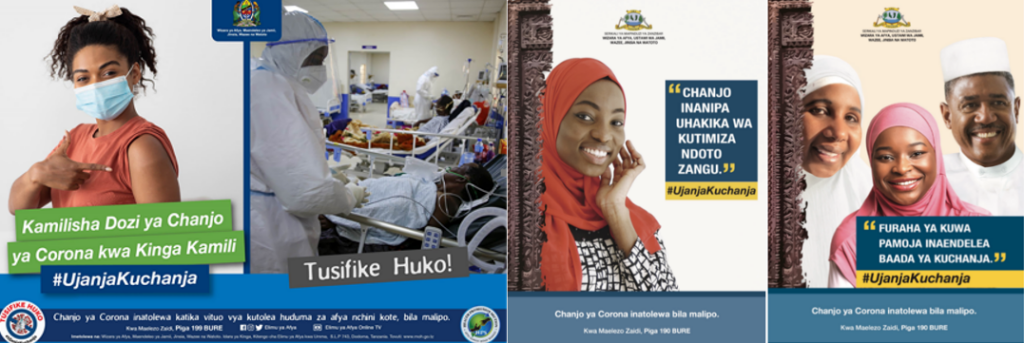
Building capacity of media outlets and journalists to deliver vaccine demand creation messages
The two projects also worked with journalists and media outlets in Tanzania to support effective, accurate reporting on COVID-19 that promotes vaccine uptake across print, radio, TV, and social media channels. As part of this initiative, they developed a COVID-19 vaccine media toolkit that consists of a journalist guide (including do’s and don’ts when reporting on, talking about, or creating content on vaccines; media resources for COVID-19 vaccine; and talking points) and frequently asked questions.
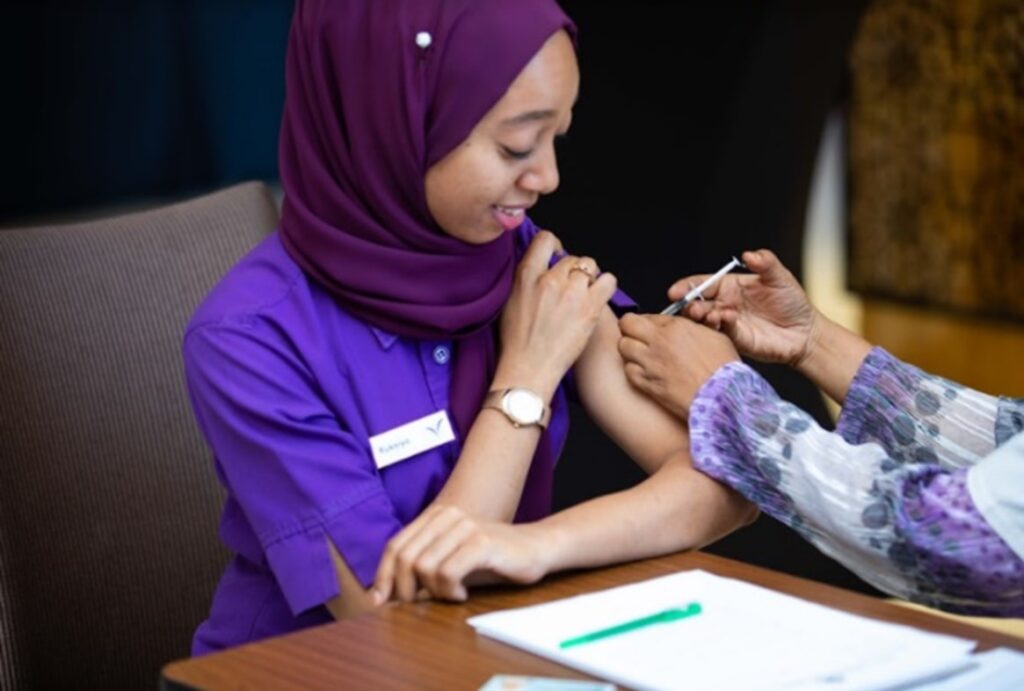
Once the toolkit was complete, the project collaborated with the MOH to conduct journalist orientations in mainland Tanzania and Zanzibar to increase knowledge about the vaccines and build skills for journalists to deliver accurate information to audiences. A total of 82 journalists (including presenters, content developers, and producers) attended the mainland Tanzania orientation, and 36 journalists attended the session in Zanzibar. Vaccines were offered during the media orientations, and 62 participants chose to receive a vaccine.
Engaging religious leaders to promote vaccination and counter misinformation
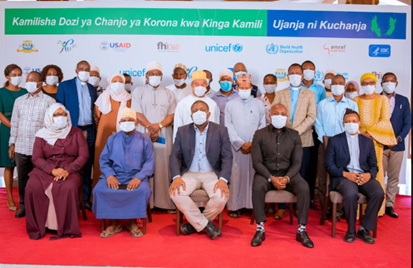
Leveraging the trust and reach religious leaders have in their communities, EpiC and Tulonge Afya engaged Christian, Muslim, and Hindu faith-based organizations (FBOs) to disseminate COVID-19 vaccination messages and debunk myths and misconceptions. The projects conducted a co-design workshop with faith leaders to develop a COVID-19 vaccine demand creation toolkit for religious leaders, then oriented 18 FBO representatives on the mainland and 17 FBO representatives in Zanzibar on how to promote vaccination among their faith communities.
In addition, they filmed interviews with six well-known faith leaders (including Bishop Augustino Shayo, who leads the Catholic Church in Zanzibar) to address concerns about vaccine safety and effectiveness. The interviews were aired across social media, TV stations, and radio stations with high listenership.
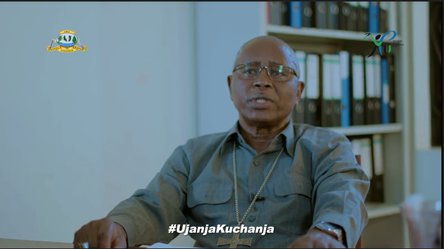
Promoting and delivering vaccines during the holiday season
During the festive holidays at the end of December, many people in Tanzania travel and interact with family members and friends. The projects produced several videos featuring an expert from the Government Chemist Laboratory Authority (GCLA), a representative from the traveler’s association, and two religious leaders about COVID-19 prevention during the holiday season, including social distancing, hand hygiene, and vaccination. The interviews were aired across four national radio stations and posted on the pages of social media influencers.

During the December holidays, EpiC conducted community mobilization events in areas with high traffic, including bus stands, markets, and ports. The project held 150 interactive public spot announcement (PSA) events in communities throughout Dar es Salaam, Arusha, and Singida. During the PSAs, a mobile van passed through strategic locations in each community and delivered COVID-19 prevention and vaccination messages, reaching 22,283 people with vaccine promotion messages. Local government authorities administered 1,034 vaccinations during the PSA events.
Supporting vaccine service delivery
In addition to ongoing demand creation activities, EpiC Tanzania is implementing a pilot project that links demand creation activities directly to vaccination services in Kisarawe District. The approaches used include engaging community leaders and community health workers to create demand and providing stipends and transport for health care workers to conduct outreach and bring vaccination services closer to people. The project has vaccinated about 7,000 people since March 1—a period of three weeks—and the project aims to vaccinate 24,000 more people to reach 60 percent of the district’s eligible population by June 2022.
Furthermore, the project is supporting direct vaccine service delivery in the Njombe and Ruvuma regions. The project aims to vaccinate 600,000 people through a combination of approaches, including training and mentoring health care workers on COVID vaccination services; supporting community-based, facility-based, mobile, and fixed site vaccine service delivery; and leveraging HIV service delivery platforms to target key and marginalized populations.
Featured Photo: A client receives a COVID-19 vaccine during community mobilization activities (EpiC Tanzania).

